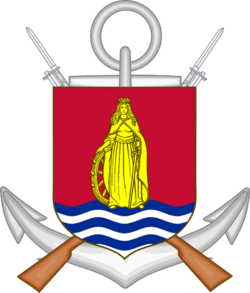Galeneism: Difference between revisions
mNo edit summary |
mNo edit summary |
||
| Line 1: | Line 1: | ||
[[File:Anchortethia.png|thumb|250px|right|Emblem depicting "Lady Arianiti".]] | [[File:Anchortethia.png|thumb|250px|right|Emblem depicting "Lady Arianiti".]] | ||
'''Galeneism''' ({{wp|Albanian language|Tethian}}: ''Galenizmin''; derived from {{wp|Galene (mythology)|Galênê}}) is a {{wp|nationalism|nationalist}} movement that supports the continued existence and prosperity of the native [[Irfan|Irfanic]] community in [[Austeria]]. Domestically it advocates for social and political policies that supports Irfan, while diplomatically Galeneism | '''Galeneism''' ({{wp|Albanian language|Tethian}}: ''Galenizmin''; derived from {{wp|Galene (mythology)|Galênê}}) is a {{wp|nationalism|nationalist}} movement that supports the continued existence and prosperity of the native [[Irfan|Irfanic]] community in [[Austeria]]. Domestically it advocates for social and political policies that supports Irfan, while diplomatically Galeneism calls for ties with Irfanic majority states and the establishment of relations that ensures the community's continued existence. The movement is widely supported by Austeria's Irfanic population and it is influential in the politics of the country. | ||
Galeneism emerged from the wider Tethian nationalist movement during the Galenian Renaissance of the early 19th century, emphasizing the Irfanic religion as a core part of the Tethian identity. It quickly became the primary ideology of Tethian public leaders who supported the creation of an unified independent Tethian state from the [[League of Kartha]]. The movement was suppressed and forced underground after the annexation of the League by the [[Kingdom of Etruria]] and remained largely moribund until the 20th century. It reemerged in the 1930s as part of the resistance to the [[Greater Solarian Republic]], becoming one of the main factions behind the [[National Liberation Movement]]. | Galeneism emerged from the wider Tethian nationalist movement during the Galenian Renaissance of the early 19th century, emphasizing the Irfanic religion as a core part of the Tethian identity. It quickly became the primary ideology of Tethian public leaders who supported the creation of an unified independent Tethian state from the [[League of Kartha]]. The movement was suppressed and forced underground after the annexation of the League by the [[Kingdom of Etruria]] and remained largely moribund until the 20th century. It reemerged in the 1930s as part of the resistance to the [[Greater Solarian Republic]], becoming one of the main factions behind the [[National Liberation Movement]]. | ||
Revision as of 18:14, 18 November 2023
Galeneism (Tethian: Galenizmin; derived from Galênê) is a nationalist movement that supports the continued existence and prosperity of the native Irfanic community in Austeria. Domestically it advocates for social and political policies that supports Irfan, while diplomatically Galeneism calls for ties with Irfanic majority states and the establishment of relations that ensures the community's continued existence. The movement is widely supported by Austeria's Irfanic population and it is influential in the politics of the country.
Galeneism emerged from the wider Tethian nationalist movement during the Galenian Renaissance of the early 19th century, emphasizing the Irfanic religion as a core part of the Tethian identity. It quickly became the primary ideology of Tethian public leaders who supported the creation of an unified independent Tethian state from the League of Kartha. The movement was suppressed and forced underground after the annexation of the League by the Kingdom of Etruria and remained largely moribund until the 20th century. It reemerged in the 1930s as part of the resistance to the Greater Solarian Republic, becoming one of the main factions behind the National Liberation Movement.
After the Solarian War and the independence of Austeria, Galeneism was established as one of the official ideologies of the Labour Party of Austeria. Under the party, Galeneism shifted towards protecting the heritage and religious freedom of Irfanics while not granting Irfan a privileged position in accordance with a secular constitution. During this time, proponents of Galeneism were largely secular and supported a socially progressive form of Irfan. During the 1970s, Irfanic refugees from Coius were settled in Austeria as part of a program established by Galeneists. Since the Morwall Agreement, more conservative strains of Galeneism have emerged which supports policies such as active proselytization in Austeria and closer ties with Irfanic states, including Zorasan.
Galeneism has never been a uniform movement and remains politically and ideologically diverse despite the influence of the Labour Party. Today, Galeneism is associated with the Kuvendi Party, Austerian Popular Movement, and the Independence Party and secular movements like the Socialist Party of Austeria. Supporters of Galeneism view it as a necessary political movement to ensure the continued existence of Irfan on the Euclean continent. Critics view it as an exceptionalist ideology incompatible with secularism or a movement for a foreign religion.
